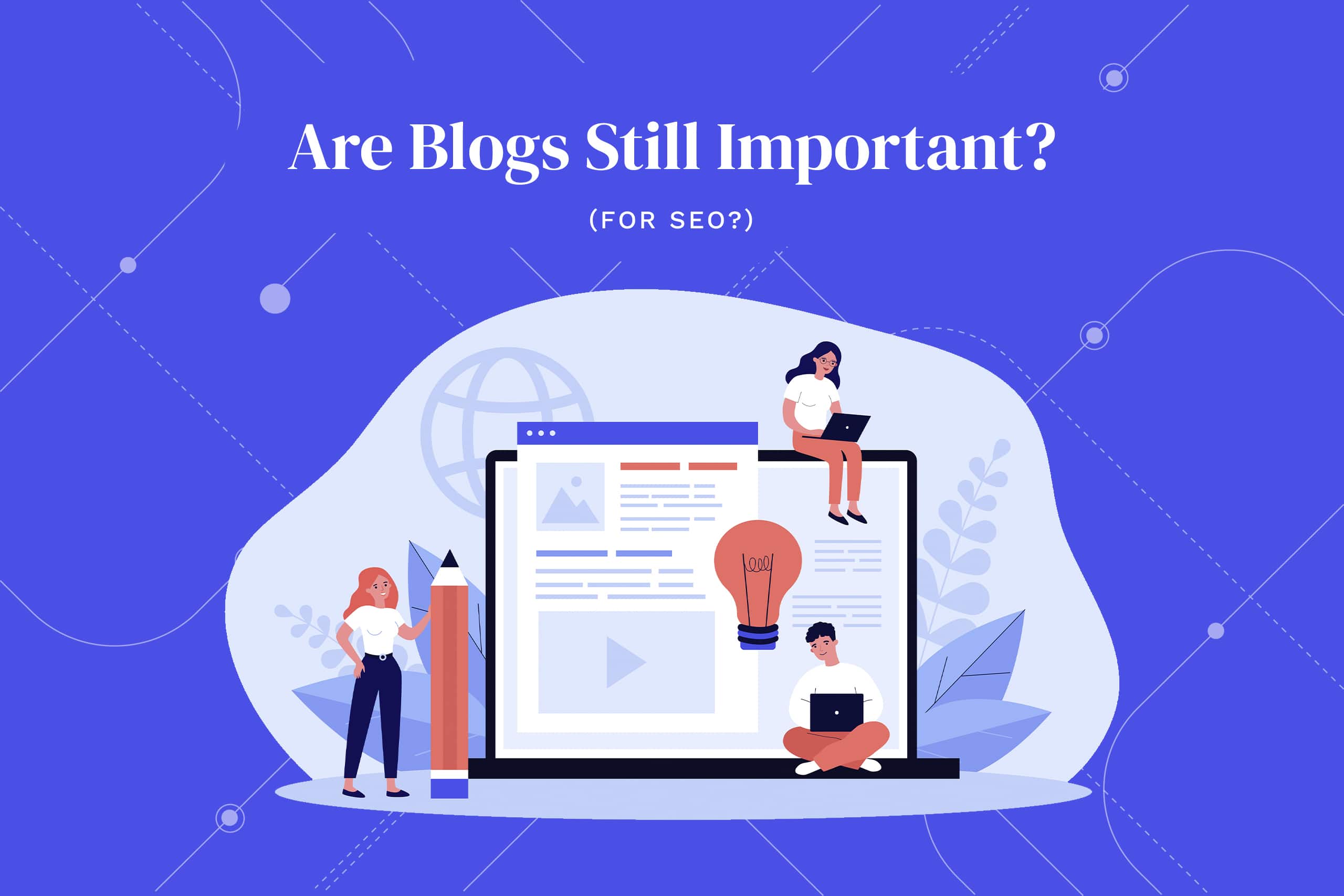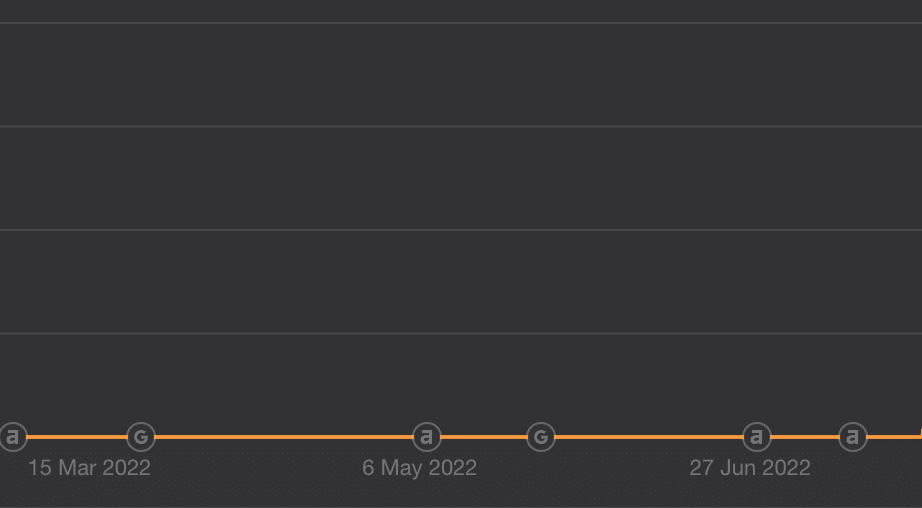
Are blogs still important? Here's why you still need a great blog in 2023: Let's face it; when you hear the word "blog," there's a good chance your mind immediately goes to your millennial cousin who thinks they're a big-time social media mogul. In the early 2010s, blogs were the hot new way to get your website to rank on search engine result pages (SERPs) and become an online influencer. And to be completely honest, a part of me misses the good old days of search engine optimization (SEO) when everything was as simple as having the proper technical tags, markup, and keywords.
The struggle we SEOs face in today's market is that Google (and the other search engines, of course, but we don't really care about them since they only possess less than 8% of the market share) has changed a LOT since the early 2010s. Like, a whole lot. And while we've seen several significant advancements, like the creation of Google Business Profile, we've also seen many hurdles put in place.
To give you an example of a big hurdle we frequently find ourselves leaping over, Google has recently placed great importance on matching searcher intent with the E-E-A-T (Expertise, Authoritativeness & Trustworthiness) of a post or page. And while this is great as a searcher, it makes it much more challenging to rank your small business for specific keyphrases that once may have been attainable.
We've passed the brief phase where Google preferred content explicitly written for search engines. In today's SEO world, Google has clarified that they will positively reward posts and pages written for humans instead of their algorithm. So what does that mean for SEOs? More work!
It is imperative that SEOs put a big focus on quality content rather than high-volume generic garbage with the perfect number of focus keyword instances. Don't get me wrong, keyword density is still important. But try to think of it as a handrailing, not an elevator.
So, to give you the short answer to our question, "are blogs still important?" the answer is YES! Blogs can make or break your SEO campaign and should be taken advantage of to their fullest extent. But don't worry; we have some actual numbers to prove our claim. Keep reading to see how writing blogs can benefit (if done well) and hurt (if done poorly) your SEO campaign.
What is a blog?
Many people will have different definitions of a blog, but for the sake of this post, a blog is simply a dynamic page containing links to other pages, typically referred to as posts, that each focus on a different topic or subtopic. That is an extremely broad definition, but hopefully, we are now on the same library shelf.
To be more specific, we are going to focus on blog posts. A blog in its entirety is comprised of posts, so without posts, we have no blog! A lot of websites use WordPress, which is our favorite platform for building SEO-friendly websites in 2022. WordPress makes it extremely easy to write and publish blog posts containing images, videos, rich text, and more.
There isn't a correct Content Management System (CMS) to use for blogging, but some are better than others. In general, as long as it is easy for you to use and allows you to categorize posts and customize permalinks, then you're rocking.

What is a blog post?
Now that we understand the difference between a blog and a post let's get into the juice of our topic. A blog post can vary dramatically from one to the next, but in general, a typical blog post found in our blog can be anywhere from 500-7,000 words in length, contain a minimum of 2 relevant photos or videos, and contain anywhere from 2-50+ internal and external links.
Again, each post will vary depending on the subject matter and purpose. But understanding the difference between a blog post and a static website page is critical. Blog posts typically cover various topics and do not necessarily have to pertain to your business or the services offered. Posts are a great way to rank for new keywords that your static pages can't seem to.
Think of blog posts as deciduous trees; their leaves change throughout the seasons and, in most climates, eventually die off. To put that in terms of blog posts, we see trends coming and going, and while our static pages don't cater to trending topics, our posts do. When they are first published, blog posts are 100% relevant. But over time, certain topics or trends become outdated and irrelevant. So how do we combat that? For topics that need to stay relevant, we can frequently update posts. These posts are known as evergreen content.
You might ask yourself, "but wait! What if I don't have time to update outdated content on my website?" When it comes to blog posts, they are typically timestamped, and a user can clearly see that certain information that may have been true in the past might not be true at the time of reading. Having an archive of topics is great for recordkeeping, which is what search engines and humans are all about. Although it is not a best practice, it won't necessarily kill your SEO efforts.
But to be clear, I don't recommend having outdated content on your website, but In some cases, it is acceptable. An example of outdated content being acceptable is if someone wants to read about the evolution of Google and see where it started and how it got to where it is today. Another example is a changelog for software. See the Search Engine Land blog for a live example.
But in general, I recommend keeping your content evergreen and ensuring you are using the ever-changing search engine algorithms to your advantage.
Why are blogs still important?
Now that we understand the differences between a blog post and a static page and how blog posts can be used, we now have to answer the question, "why are blogs still important?" For all of you linear-minded folks like myself, I will break my points into a list of search engine ranking factors that blog posts can positively affect (assuming your blogs are well-written and use the proper syntax/markup).
Since I am an SEO, I feel the need to stress that these positive effects will only happen if you use proper technical SEO techniques and stick to each search engine's posted guidelines. And as expected, nothing is guaranteed with SEO. Please use these ideas as ideas for inspiration rather than the end-all-be-all guide to boosting SERP rankings. Also, do your best to avoid common black hat SEO tactics. Okay, disclaimer over; let's get to the good stuff!
1. Blog posts can increase website traffic
One of the main benefits of regular blog posting is the possibility of boosting your overall organic website traffic. And at the end of the day, our clients tend to love when they get more traffic because more traffic usually results in more leads for their small business. And more leads from organic traffic mean less money needs to be spent on paid ads.
But don't just take my word for it. As a case study, I kept track of my personal photography website's traffic for several months without blog posting and the months following with regular blog posting. Here was my website traffic before regular blog posting:

See that solid orange line at the bottom? No, that isn't for decoration. That was an average of 1 page view per day for 4 straight months. But hey, I'm just a small-time photographer, don't hate me.
Now, with regular blog posting, I was able to turn my traffic from a pretty straight line of disappointment to this:

I went from an average of 1 page view per day to about 50 page views per day thanks to posting only 1 blog per month. Had I posted 2 posts per month or even 3? I'm sure that number would be even greater.
But before you run out and start pumping out a million words per minute, keep these thoughts in mind when it comes to blog posting:
Things to keep in mind when writing an effective blog post
- Do your research!
- Pick a topic that pertains to your niche.
- Use a keyword planner to find commonly searched queries.
- Understand how your domain authority compares to other competitors posting about the same topic
- Focus on quality over quantity.
- Don't pay someone $50 to write ten blogs for you; they won't be very effective and may even hurt your ability to rank.
- Write about what you know.
- You will rank higher on SERPs if you write about a topic in which you possess expertise, thanks to Google's recent focus on E-A-T (Expertise, Authoritativeness & Trustworthiness).
- Use a strong target keyword.
- Be smart about your topic; don't pick a keyword such as "how to ride a bike" if your domain authority is only 2 because you will most certainly be buried by hundreds of other higher authority posts.
- Pick a keyword that will commonly be searched (again, do your research!); many people ask questions on search engines, so use that to your advantage.
- Maintain strong technical SEO
- Ensure you are using the best technical SEO practices; metadata, keywords, exactly one H1 tag per page, etc.
2. Frequent posting sends good signals to search engines
Fresh content is essential for SEO; moreover, regular blog posting—a minimum of one blog post per month—will send a positive message to search engines that goes something like, "hey man, this website is PHRESH, and we know what we're doing so please let us rank!"
And while the simple fact of updating your website frequently will not in itself get you to the top of the SERPs, you better believe it is a small piece that can only help your chances.
A question we often receive from clients is, "how often should I update my website for optimal SEO?" Well, that entirely depends. Our rule of thumb is to update a website whenever it needs to be updated. But, to give you a tangible answer, updating your website every day would not be too often and updating your website at least once a month would be the bare minimum.

3. Posts can improve/increase organic keyword rankings
Getting into my favorite point of blog posting, frequent posts can improve your rankings for existing organic keywords and can also increase the number of keywords for which your website will organically rank. Again, picking the right subject matter is imperative for this to work.
If we were working on a local plumber's website, we probably wouldn't post about what exhaust system to put in your 1968 Camero. Sure, pipes are involved in that post but not the type of pipes for which we want them to rank.
But on the other end, you don't have to limit yourself to certain topics. Instead of posting about the different types of pipes for different scenarios or how to install a boiler, we could venture into a topic such as "is Drano bad to use in my home?" or something that pertains to plumbing but doesn't necessarily make your reader want to fall asleep.
It's also important to pick a topic that is commonly searched for. Otherwise, no one will ever find your post. Blog posts are a great way to rank for certain keywords that your static pages may not. A great example of this would be if a plumber wanted to rank for "how to unclog a drain" but didn't want to create a static page about unclogging a drain since that is such a specific topic.
Often we see our posts ranking for keyphrases we did not mean for them to rank. But that's the beauty of Google; their algorithm is highly intelligent and can easily detect your topic(s), even if you didn't mean to focus on them.
4. Consistent posting improves a website's link structure
This is another "it depends on what you do" point. Like everything in SEO, there is a good balance to hit with links, which can very easily be overdone. While there is no right answer to the number of internal and external links you use in a post, our rule of thumb is to use a minimum of 2 internal links and 2 external links on each of our posts.
Adding 100 links to your post would probably seem spammy to Google unless your post was 10,000 words long.
The whole point of a search engine is to link to other websites. Without links, our vast network of websites is nonexistent. So with that said, make sure you add hyperlinks to your blog posts. But be mindful of the links to which you are directing your users. Be protective of your domain authority. It is a generally accepted concept that linking to websites with a lower domain authority than your own can have a negative impact on your domain authority.
So, ensure you find reputable pages and domains before mindlessly directing your traffic to them. But also ensure you don't post anything with no links to other pages on your website or other websites, as that may have a negative impact on that post's performance.
If you come across a great post, but its domain authority is less than ideal, you can still link to them without impacting your score. Using a Nofollow attribute in your link, you can direct users to that post while telling search engines you do not endorse that domain.
5. Great pillar posts can boost domain authority
Pillar posts are a great way to earn yourself some valuable backlinks. If that sentence sounded like complete nonsense to you, let's quickly break it down.
A pillar post is simply an in-depth post that covers all aspects of a broad topic and links to cluster posts to fill in the blanks on the smaller subtopics. For example, this post is a pillar post. We are covering the importance of writing regular blog posts, which is a HUGE topic. We are also linking to many posts about subtopics mentioned in this post that would be unorthodox to include all in this post (unless you want me to write a 200-page novel on this topic, which I highly doubt).
A website's domain authority is a measurement used by a search engine that considers several hundred different SEO factors, such as page speed, backlink profile, expertise, etc. Domain authority is used as a means to position different websites that rank for the same topic. For example, our domain authority is 56/100 (which is really good!), and Apple's website has a domain authority of 100/100 (which is insanely good). So, if we both wrote the same blog post, Apple would rank higher than us due to their higher level of trust or domain authority.
Now, how do those topics pertain to our question: why are blogs still important? Simple. When other people come across a great blog post, there is a chance they will link to it from their website. And when you write a great blog post, it has the potential to attract high-domain authority websites. The name of the game is to get other highly trusted websites to link to your website, which tells Google to trust your website even more.
Don't be afraid to put in several hours to write a great blog post because the potential benefits will pay off tremendously.
6. Well-written content can more easily match the searcher's intent
This one stems from a relatively new concept with Google in particular. Their approach is to match the searcher with the best results to match their search intent as best as possible. For example, if someone searched for "barbers near me," it wouldn't benefit them to see a list of gas stations. This principle has been around since the dawn of Google, but in recent years has been much more refined.
Rather than spending another two hours talking about searcher intent, let's just agree that writing blog posts with the idea of matching commonly searched queries is of the utmost importance regarding SEO.
Google gives users no control over the search results shown, but one way you can actively try to work in tandem with Google's algorithm is to add structured data markup to your website when appropriate. Additionally, asking common questions in h2 elements on your blog posts may result in your post showing up as a rich snippet on search results. Video rich-snippets are also one of the top-performing snippets on Google, so don't neglect your videos!
Conclusion
Now that I've answered, "why are blogs still important?" Let's quickly recap the points. Blog posts contain content that can help your website rank for commonly searched queries when written well and strategically. When posts rank for more search terms, chances are your website will get more organic traffic, which alleviates the need to spend money on ads and increases the number of legitimate leads.
Additionally, updating your website often tells Google that your website is relevant and should be rewarded. Content exhibiting strong E-A-T will be even more rewarded and will be matched more organically with the searcher's intent. And once you create solid pillar posts that other high-authority websites want to refer to, your website's domain authority will be positively impacted.
As a professional SEO, one of the most common conversations I have with clients and potential clients is regarding blogs and why it is important to have one today. I understand that social media influencers and baking bloggers have given blogs a bad name in previous years. But don't let that deter you from understanding just how powerful a blog post can be.
Adding one blog post per month to your website can work wonders for your traffic and rankings. But if you've gotten this far and are now wondering where in the world you would find the time to write blogs, I implore you to get in touch with us to see how we can revolutionize your SEO campaign and bring life to your business. Surely you can see that blogs work because I'm guessing you found this one from searching Google, right?
Don't leave your SEO campaign to chance. We deliver top-level SEO services with integrity and transparency, always going above and beyond. Get in touch today to learn more!


